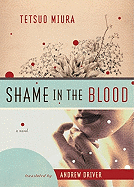

Both Miura's unnamed narrator and Miura himself suffer from terror of their own genetic make-up. Miura and his narrator are both writers desperately trying to work out their demons, telling the same story over and over, the story of Miura's real-life family. One sister threw herself into the sea. One sister took poison. One brother disappeared. One brother ran off with the family funds. And then there's Miura. With the history of his brothers and sisters, he can only wonder in fear what will he do to shame his family. Does he not have the same blood?
There's a startling moment when you begin the second story and realize you've already covered this ground, that the tale of the narrator's shattered family and his love for Shino is being told again, but differently this time. Each of the five tales takes a different moment in the same narrative. What is told in one sentence in the third story becomes the subject of the fourth story. As exasperated as the reader gets with the narrator, who refuses to work so that he can lock himself in his room and write stories that he can't sell, the troubled little narratives that have resulted are his redemption and our joy. Slowly you learn more and more about Miura's brave, tragic family and the hair's breadth difference between good luck and bad.
Fascinating minor characters abound--the idealistic bookseller who buys the narrator's books, the cast-off girlfriend of a college buddy, kind neighbors and childhood friends, broom makers and house maids, the unnoticed, forgettable people of the world.
The last novella has nothing to do with the first five. Maybe this means Miura has worked out his demons and can go on to tell another story besides his own. Its central image--a father swinging his daughter in a field and becoming so exuberant he's careless--captures Miura's melancholy sense of the randomness of fate. Jaded readers will find that set-ups in Miura's world seldom lead to the pay-offs we expect. What looks like a "Dear John" letter can really be a proposal of marriage.--Nick DiMartino

